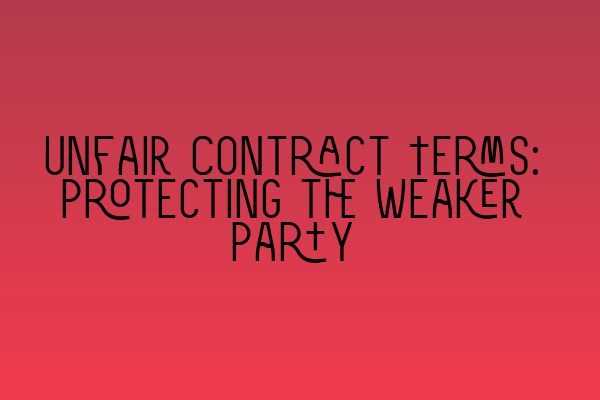Unfair Contract Terms: Protecting the Weaker Party
Contracts are an essential part of modern business and personal transactions. They establish the rights and obligations of the parties involved and provide a framework for resolving potential disputes. However, not all contracts are fair or balanced. In some situations, one party may have significantly more bargaining power than the other, resulting in the potential for unfair contract terms. In this article, we will explore the concept of unfair contract terms and the measures in place to protect the weaker party.
What are Unfair Contract Terms?
Unfair contract terms refer to provisions or clauses within a contract that significantly disadvantage one party while favoring the other. These terms typically arise in situations where there is an imbalance of power between the parties involved, such as in consumer contracts or contracts between businesses of unequal size and resources.
Unfair contract terms can take various forms. They may limit or exclude the liability of one party for certain actions or events, impose excessive penalties or fees on one party, or grant one party unilateral rights to terminate the contract without valid reasons. These terms can have a detrimental impact on the weaker party, depriving them of their legal rights and remedies.
The Legal Framework: Protecting the Weaker Party
In many jurisdictions, including the United Kingdom, legislation exists to protect the weaker party from unfair contract terms. In the UK, the primary legislation governing unfair contract terms is the Consumer Rights Act 2015.
The Consumer Rights Act sets out specific provisions to protect consumers from unfair terms in contracts with traders. It defines what constitutes an unfair term and renders such terms unenforceable. The Act also provides consumers with the right to challenge the fairness of contract terms and seek redress through legal means.
For business-to-business contracts, the Unfair Contract Terms Act 1977 (UCTA) applies. The UCTA aims to regulate the use of unfair contract terms in contracts between businesses and to promote fairness and transparency. Under UCTA, any unfair term in a business contract can be subject to scrutiny and potential unenforceability.
Additionally, there are general principles of contract law that can be invoked to challenge unfair contract terms. These principles include the doctrine of unconscionability, which protects parties from oppressive or unfairly advantageous contract terms, and the requirement of good faith in negotiating and performing contracts.
Challenging Unfair Contract Terms
If you believe that you have been subjected to unfair contract terms, it is essential to seek legal advice to understand your options and potential remedies. Challenging unfair contract terms can be a complex process, and professional guidance can help you navigate the legal landscape more effectively.
When challenging unfair contract terms, it is crucial to gather evidence to support your case. This may include reviewing the contract itself, documenting any communications or representations made during the negotiation process, and identifying any legal provisions or statutes that may apply to your situation.
In many cases, negotiation or mediation may be the first step in resolving the dispute. A skilled solicitor can guide you through this process and help you reach a fair and satisfactory resolution. However, if negotiation fails, litigation may be necessary to challenge the unfair contract terms and seek proper redress.
Conclusion
Unfair contract terms can have far-reaching consequences for parties involved in a contract, especially those with less bargaining power. It is essential to be aware of your rights and the legal framework in place to protect the weaker party. Seeking legal advice when faced with unfair contract terms is crucial to understanding your options and taking the appropriate steps to challenge and rectify the situation.
If you’re preparing for the SQE exams and want more resources, consider checking out these related articles:
